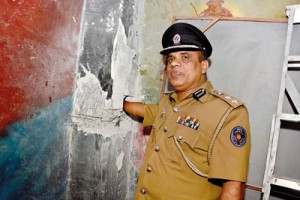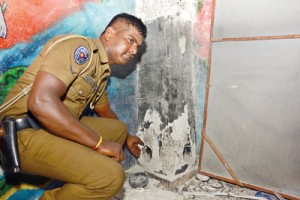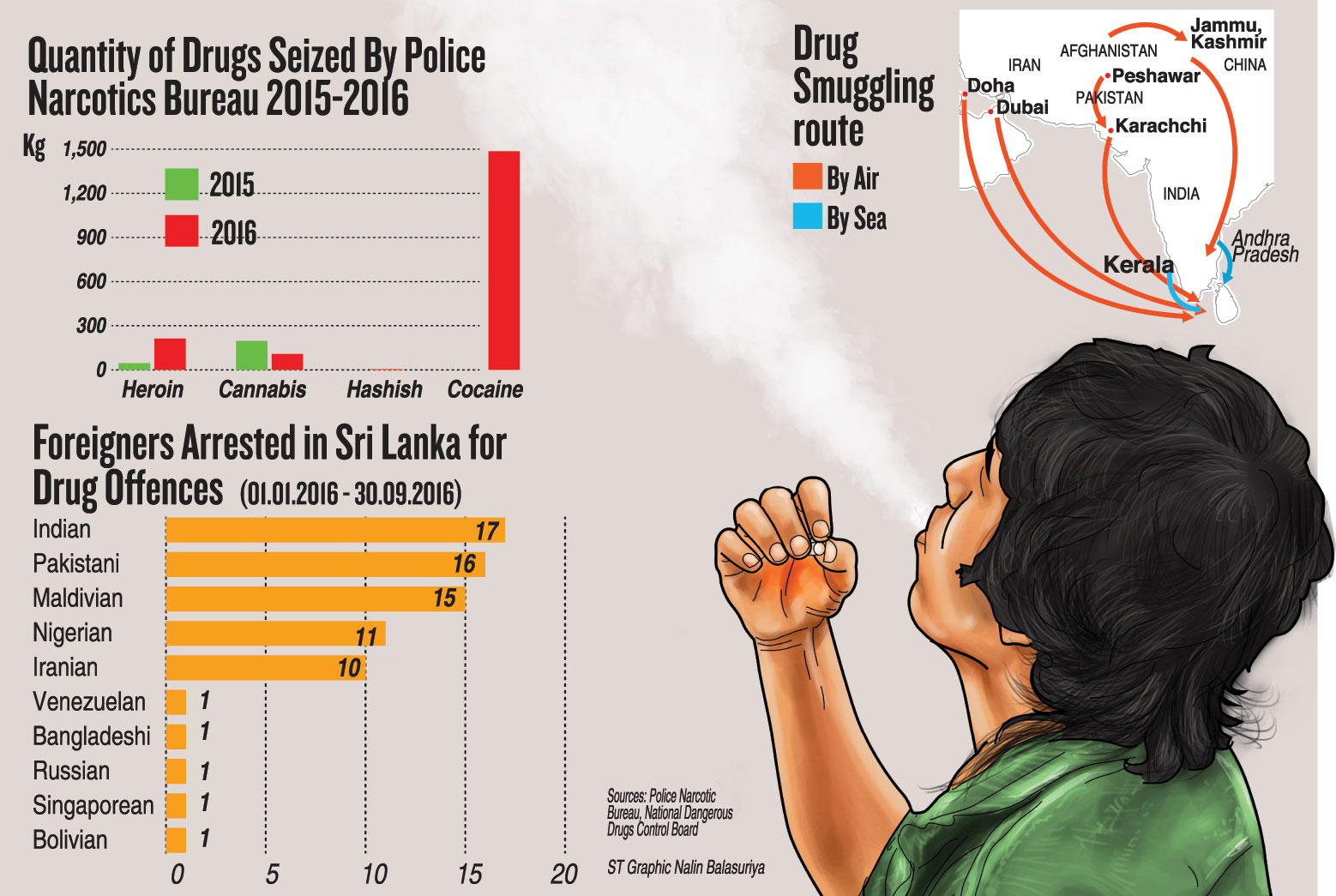News
Drug trafficking on a high despite major detections in the recent past

Busting a well-organised heroin racket centered in Grandpass: Police show where Rs.8 million was hidden in a house after they nabbed a suspect who had 13kg of heroin hidden in his travelling bag. Pix by Gayan Amarasekera
Sri Lanka can no longer be considered a ‘soft’ transit point for narcotics given the record number of drug detections in the past few years and continuing, authorities say.
According to the Police Narcotics Bureau (PNB), while 46kg of heroin were seized in island-wide raids in 2015, last year the amount seized had increased to 206 kg. This statistic included 101 kg of heroin seized from a dhow off the island’s southern coast on March 30 in a joint operation by the PNB and Sri Lanka Navy. This is the largest amount of heroin to be seized in a maritime operation by any Indian Ocean island state, the Sunday Times learns.
According to the 2016 Annual Report of the International Narcotics Control Board (INCB), cannabis and heroin top the list of narcotics in Sri Lanka. “Trafficking of heroin from South-West Asia to India and then to Sri Lanka, Maldives and countries in Western Europe has been identified by the Narcotics Control Bureau of India as a major trafficking route,” the report stated.
Meanwhile authorities say better coordination among different branches of law enforcement agencies as well as the armed forces has been a significant factor in detecting large consignments of narcotics. “We have been working more closely with the navy and even local police stations within the past few years and this is helping us in our effort,” a PNB source disclosed, citing as an example the joint PNB-Navy raid that intercepted the heroin-carrying dhow as an example.
A key indicator of the success in efforts has been the regular detection of large stocks of cocaine over the past year. In 2016, authorities seized over 1550 kg of cocaine– including the 928 kg of cocaine seized on December 9 from a vessel that arrived from Ecuador. The drug haul was recorded as the largest single detection of cocaine in South Asia. As cocaine is considered a more high-end drug and is expensive, authorities say only a small portion of the seized drugs are intended for local consumption. A major portion is meant for other destinations.
Speaking at Thursday’s launch of the INCB annual report in Sri Lanka, at the National Dangerous Drugs Control Board (NDDCB), Shanaka Jayasekara, Programme Coordinator of the United Nations Office on Drugs and Crime (UNODC) in Colombo said what was unique about Sri Lanka was that the law enforcement agencies be it be the PNB, Customs or Excise Department, have taken the fight to the drug traffickers with their own resources and on their own initiative. Across the world, the UNODC and donor countries contribute large resources and technical assistance to countries that have major drug problems to fight drug trafficking. In comparison, foreign financial assistance provided to Sri Lanka to counter drug trafficking was “negligible,” he added. Despite this, law enforcement agencies here have not only out-performed their South Asian colleagues but punched above their weight in the fight against drugs, Mr. Jayasekara stressed. 
The past several days also saw several major detections of narcotics. On Friday, police announced that they had busted a well-organised heroin racket centered in Grandpass, Colombo and the arrest of five suspects. The alleged importer of the drugs, was among those arrested. According to police the the initial breakthrough had come by chance. On Monday (March 6) evening, a Sub Inspector and two constables from Grandpass Police were engaged in a routine operation in the Mahawatte area when they stopped an individual whom they thought was behaving in a suspicious manner, at Nagalagam Street. They found 13kg of heroin hidden in his travelling bag. A subsequent test revealed that the substance was pure ‘brown sugar’ heroin. Police later searched the house where the heroin was allegedly being taken to be stashed and recovered over Rs.8 million in cash hidden there. Four vehicles and three motorbikes allegedly used by the suspects were also seized. Police are currently searching for two other suspects, including a woman, in connection with the case.
As part of new initiatives to eradicate drug smuggling, Police are also exploring the possibility of confiscating the properties of drug dealers under the Money Laundering Act.
Meanwhile, smugglers continue to use air travellers as couriers to smuggle drugs into the country. A 25-year-old Pakistani national became the latest such courier to be arrested when he was detained at the Bandaranaike International Airport (BIA) in Katunayake on March 4 while allegedly trying to smuggle in 5.5 kg of heroin worth Rs.50 million. The powdered heroin had been melted down and hidden within three separate rubber carpets. The suspect had been on a flight that arrived from Qatar. Police say Pakistan remains a key location for smuggling heroin to Sri Lanka. Seventeen Pakistani nationals were taken into custody last year on charges of heroin possession, according to Police Headquarters. Twelve of those were arrested at the BIA itself. Indians however, outnumbered Pakistanis arrested last year for alleged drug possession. Twenty Indians were arrested in 2016 on drugs charges.
Authorities also pointed out that the smuggling of Kerala Cannabis, or ‘Kerala Ganja’ from India continued unabated. On Thursday night, Police in Chavakachcheri, Jaffna, recovered 231kg of the drug packed in 11 parcels hidden near a field. The suspects have not been identified.
President Maithripala Sirisena also highlighted the problem of illicit drugs being trafficked during his address to the Indian Ocean Rim Association (IORA) Leaders’ Summit in Indonesia this week.
“It is universally recognised that all littoral states possess a maritime area bordering their coasts within which they exercise complete authority. However, beyond this limit, the high seas are not subject to the jurisdiction of any state. Most of the illicit drugs are smuggled into the country from the sea beyond the territorial waters,” President Sirisena pointed out.
He suggested that the IORA workout regulations to confront these concerns in conformity with the principles of the freedom of navigation.


